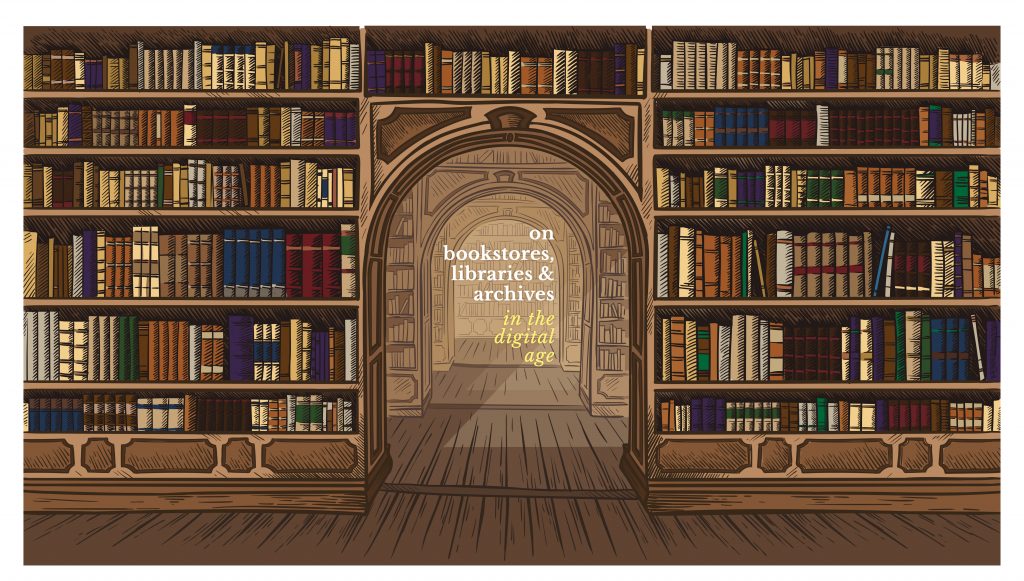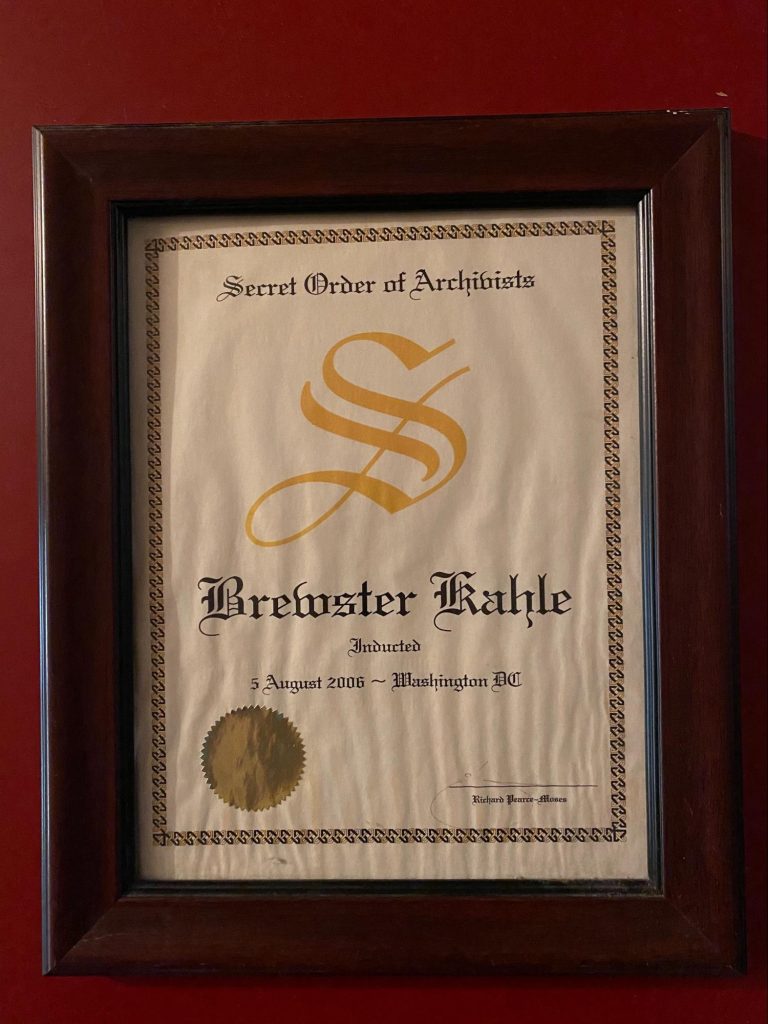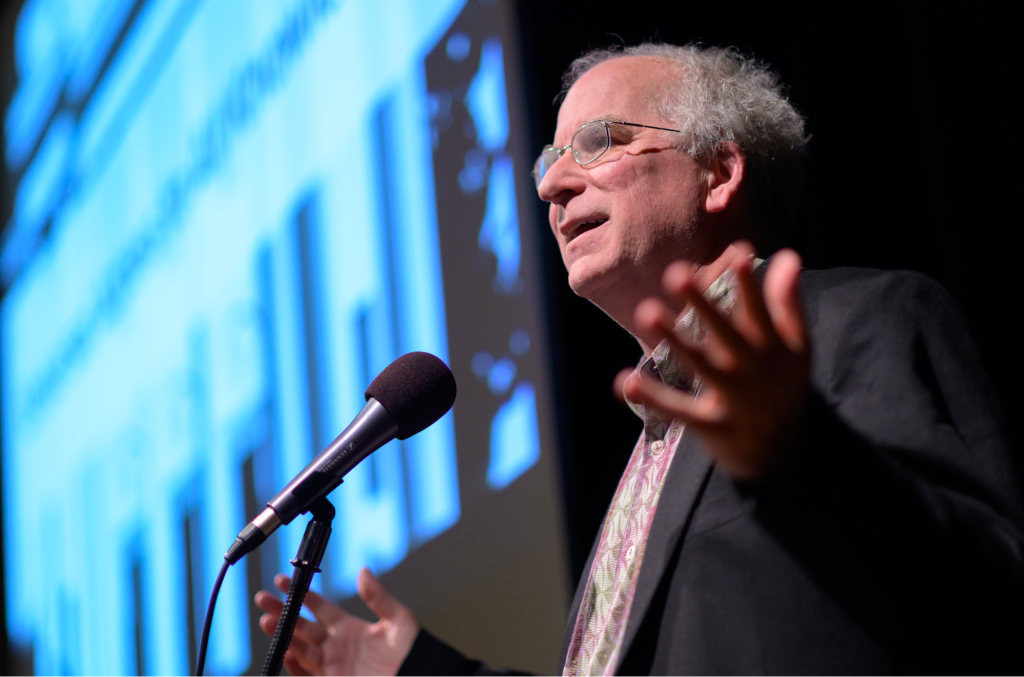
The following was a guest post by Brewster Kahle in Against The Grain (ATG). See the original article from September 28, 2020 on the ATG website here.

Back in 2006, I was honored to give a keynote at the meeting of the Society of American Archivists, when the president of the Society presented me with a framed blown-up letter “S.” This was an inside joke about the Internet Archive being named in the singular, Archive, rather than the plural Archives. Of course, he was right, as I should have known all along. The Internet Archive had long since grown out of being an “archive of the Internet”—a singular collection, say of web pages—to being “archives on the Internet,” plural. My evolving understanding of these different names might help focus a discussion that has become blurry in our digital times: the difference between the roles of publishers, bookstores, libraries, archives, and museums. These organizations and institutions have evolved with different success criteria, not just because of the shifting physical manifestation of knowledge over time, but because of the different roles each group plays in a functioning society. For the moment, let’s take the concepts of Library and Archive.
The traditional definition of a library is that it is made up of published materials, while an archive is made up of unpublished materials. Archives play an important function that must be maintained—we give frightfully little attention to collections of unpublished works in the digital age. Think of all the drafts of books that have disappeared once we started to write with word processors and kept the files on fragile computer floppies and disks. Think of all the videotapes of lectures that are thrown out or were never recorded in the first place.
Bookstores: The Thrill of the Hunt
Let’s try another approach to understanding distinctions between bookstores, libraries and archives. When I was in my 20’s living in Boston—before Amazon.com and before the World Wide Web (but during the early Internet)—new and used bookstores were everywhere. I thought of them as catering to the specialized interests of their customers: small, selective, and only offering books that might sell and be taken away, with enough profit margin to keep the store in business. I loved them. I especially liked the used bookstore owners—they could peer into my soul (and into my wallet!) to find the right book for me. The most enjoyable aspect of the bookstore was the hunt—I arrived with a tiny sheet of paper in my wallet with a list of the books I wanted, would bring it out and ask the used bookstore owners if I might go home with a bargain. I rarely had the money to buy new books for myself, but I would give new books as gifts. While I knew it was okay to stay for awhile in the bookstore just reading, I always knew the game.
Libraries: Offering Conversations not Answers
The libraries that I used in Boston—MIT Libraries, Harvard Libraries, the Boston Public Library—were very different. I knew of the private Boston Athenæum but I was not a member, so I could not enter. Libraries for me seemed infinite, but still tailored to individual interests. They had what was needed for you to explore and if they did not have it, the reference librarian would proudly proclaim: “We can get it for you!” I loved interlibrary loans—not so much in practice, because it was slow, but because they gave you a glimpse of a network of institutions sharing what they treasured with anyone curious enough to want to know more. It was a dream straight out of Borges’ imagination (if you have not read Borges’ short stories, they are not to be missed, and they are short. I recommend you write them on the little slip of paper you keep in your wallet.) I couldn’t afford to own many of the books I wanted, so it turned off that acquisitive impulse in me. But the libraries allowed me to read anything, old and new. I found I consumed library books very differently. I rarely even brought a book from the shelf to a table; I would stand, browse, read, learn and search in the aisles. Dipping in here and there. The card catalog got me to the right section and from there I learned as I explored.
Libraries were there to spark my own ideas. The library did not set out to tell a story as a museum would. It was for me to find stories, to create connections, have my own ideas by putting things together. I would come to the library with a question and end up with ideas. Rarely were these facts or statistics—but rather new points of view. Old books, historical newspapers, even the collection of reference books all illustrated points of view that were important to the times and subject matter. I was able to learn from others who may have been far away or long deceased. Libraries presented me with a conversation, not an answer. Good libraries cause conversations in your head with many writers. These writers, those librarians, challenged me to be different, to be better.
Staying for hours in a library was not an annoyance for the librarians—it was the point. Yes, you could check books out of the library, and I would, but mostly I did my work in the library—a few pages here, a few pages there—a stack of books in a carrel with index cards tucked into them and with lots of handwritten notes (uh, no laptops yet).
But libraries were still specialized. To learn about draft resisters during the Vietnam War, I needed access to a law library. MIT did not have a law collection and this was before Lexis/Nexis and Westlaw. I needed to get to the volumes of case law of the United States. Harvard, up the road, had one of the great law libraries, but as an MIT student, I could not get in. My MIT professor lent me his ID that fortunately did not include a photo, so I could sneak in with that. I spent hours in the basement of Harvard’s Law Library reading about the cases of conscientious objectors and others.
But why was this library of law books not available to everyone? It stung me. It did not seem right.
A few years later I would apply to library school at Simmons College to figure out how to build a digital library system that would be closer to the carved words over the Boston Public Library’s door in Copley Square: “Free to All.”
Archives: A Wonderful Place for Singular Obsessions
When I quizzed the archivist at MIT, she explained what she did and how the MIT Archives worked. I loved the idea, but did not spend any time there—it was not organized for the busy undergraduate. The MIT Library was organized for easy access; the MIT Archives included complete collections of papers, notes, ephemera from others, often professors. It struck me that the archives were collections of collections. Each collection faithfully preserved and annotated. I think of them as having advertisements on them, beckoning the researcher who wants to dive into the materials in the archive and the mindset of the collector.
So in this formulation, an archive is a collection, archives are collections of collections. Archivists are presented with collections, usually donations, but sometimes there is some money involved to preserve and catalog another’s life work. Personally, I appreciate almost any evidence of obsession—it can drive toward singular accomplishments. Archives often reveal such singular obsessions. But not all collections are archived, as it is an expensive process.
The cost of archiving collections is changing, especially with digital materials, as is cataloging and searching those collections. But it is still expensive. When the Internet Archive takes on a physical collection, say of records, or old repair manuals, or materials from an art group, we have to weigh the costs and the potential benefits to researchers in the future.
Archives take the long view. One hundred years from now is not an endpoint, it may be the first time a collection really comes back to light.
Digital Libraries: A Memex Dream, a Global Brain
So when I helped start the Internet Archive, we wanted to build a digital library—a “complete enough” collection, and “organized enough” that everything would be there and findable. A Universal Library. A Library of Alexandria for the digital age. Fulfilling the memex dream of Vanevar Bush (do read “As We May Think“), of Ted Nelson‘s Xanadu, of Tim Berners-Lee‘s World Wide Web, of Danny Hillis‘ Thinking Machine, Raj Reddy’s Universal Access to All Knowledge, and Peter Russell’s Global Brain.
Could we be smarter by having people, the library, networks, and computers all work together? That is the dream I signed on to.
I dreamed of starting with a collection—an Archive, an Internet Archive. This grew to be a collection of collections: Archives. Then a critical mass of knowledge complete enough to inform citizens worldwide: a Digital Library. A library accessible by anyone connected to the Internet, “Free to All.”
ABOUT THE AUTHOR

Brewster Kahle, Founder & Digital Librarian, Internet Archive
A passionate advocate for public Internet access and a successful entrepreneur, Brewster Kahle has spent his career intent on a singular focus: providing Universal Access to All Knowledge. He is the founder and Digital Librarian of the Internet Archive, one of the largest digital libraries in the world, which serves more than a million patrons each day. Creator of the Wayback Machine and lending millions of digitized books, the Internet Archive works with more than 800 library and university partners to create a free digital library, accessible to all.
Soon after graduating from the Massachusetts Institute of Technology where he studied artificial intelligence, Kahle helped found the company Thinking Machines, a parallel supercomputer maker. He is an Internet pioneer, creating the Internet’s first publishing system called Wide Area Information Server (WAIS). In 1996, Kahle co-founded Alexa Internet, with technology that helps catalog the Web, selling it to Amazon.com in 1999. Elected to the Internet Hall of Fame, Kahle is also a Fellow of the American Academy of Arts and Sciences, a member of the National Academy of Engineering, and holds honorary library doctorates from Simmons College and University of Alberta.
it is hard to share books and data to all parts of humans but we must do it . some peoples havnt mony to get book.
I.A. is the Archive of Archives.
I am totally agree with Brewster Kahle arguments on Digital Libraries. Technology is making education simpler during this pandemic.
great .
Archives have played an important part in academics and research projects. It will continue to be so. I just realized why archive.org has been named so instead of conventional term archives. Thanks for keeping the gargantuan online records store house alive.
I have never heard of these digital libraries before. That was interesting.